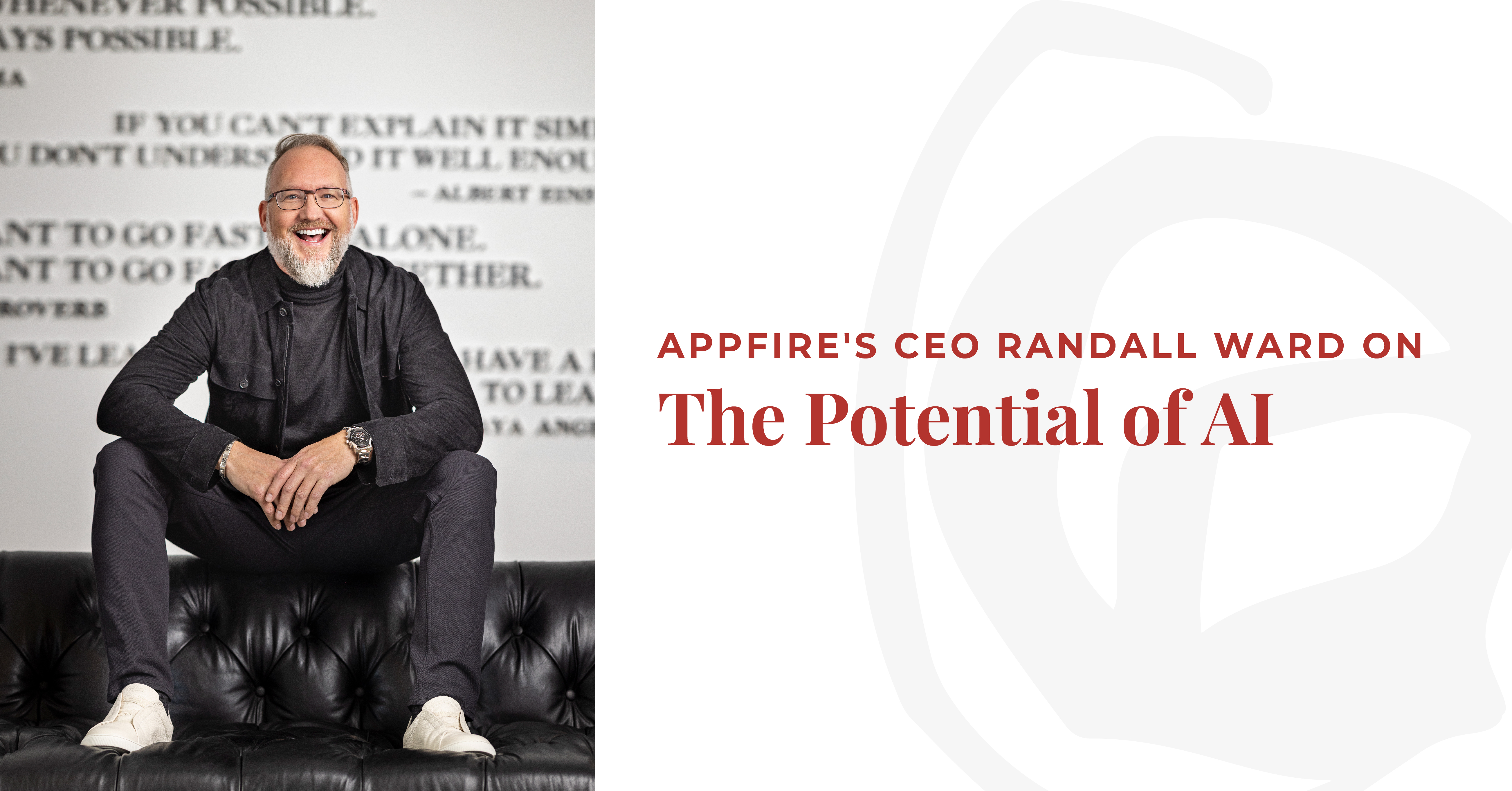10 Questions with Randall Ward, co-founder and CEO of Appfire
Jul 14, 2023 Tiffany Darmetko
The massive hype around generative AI carries mixed sentiments, as some voices tout its potential while others caution about risks. Randall Ward, co-founder and CEO of Inkhouse client Appfire has an optimistic and practical view.
“Generative AI is a long-term technology advancement that is going to dramatically transform how business is conducted. With AI, the customer wins, careers will grow and industries will advance,” he predicts.
In particular, Appfire recognizes that AI plays a significant role in the future of the SaaS-driven enterprise. The company has experienced meteoric growth stemming from its ability to supply innovative SaaS apps, including AI-powered applications, that enhance major platforms like Atlassian, Microsoft, monday.com, Salesforce and Slack, to enable dynamic collaboration of the hybrid workforce.
Out ahead of AI Appreciation Day 2023 on July 16, I was lucky enough to catch up with Randall to get his thoughts about the future of an AI world. Read on for our full Q&A. Randall, many many thanks for sharing your wisdom.
Will an immersive AI world be a positive or negative thing, or both?
Randall: I see AI as a positive, not a threat. Technology has always been used for both good and bad, no matter what the technological advancement is, and the Internet is probably the most profound example. We’re most definitely seeing both sides of the coin with AI. Ironically, the harm that can be caused can also be rapidly unwound because of AI, which gives us the power to wage a faster, more effective response.
How will AI shape the future of businesses?
Randall: We’re heading towards an immersive AI world and we have to understand that this is going to be a lasting part of business forever. AI brings opportunity and value to organizations, customers and the world. There’s great potential to create more software, employees will be empowered to grow their skill sets, and products will be safer, stronger and more reliable. I see many more products being developed in the future because of AI and many more people being able to get their ideas to market -- and that’s super cool!
How will AI influence customer experience?
Randall: With AI, the customer definitely wins. When it comes to product purchases and subscriptions, customers gain access to a more valuable collective product set because software will advance and roll out to market faster. Product teams will be able to ship more reliable products safer and faster to customers. AI will give analysts a more holistic view of customers’ needs and product experiences, in order to better meet those needs and improve CX.
Which industries will AI benefit the most?
Randall: I see the potential for vast improvements across just about every industry but education and medicine are my top two picks. When we think about the universal problem today with our universities and issues like top-down learning and access to education where you have to have a high fee structure, all of that disappears in the future with AI. Everyone’s going to have access to structured learning capabilities using AI programs at a fraction of the cost or even zero cost.
In the field of medicine, AI, in some cases, can do a better job thinking through problem states. There are a ton of clinical studies and a massive catalog of information, and humans just don’t have enough time/compute cycles and capacity to process and apply all of this material. But with AI advancements, the information can be accessed by a machine to overcome these drawbacks and augment human abilities, driving toward a world with better patient outcomes.
How will AI impact jobs?
Randall: I have a net positive viewpoint on AI as it relates to job roles and skill development. AI will grow careers. People are talking about how copywriters are going to be out of work. No, they’re just going to be doing different types of copywriting. In fact, AI is helping us to be better writers. Across many professions, workers will take the skillsets they’ve honed over the course of their careers and apply them in aspects that AI can’t control.
In the world of software development, for example, there are a lot of things software engineers do every day that they don’t want to do. They waste keystrokes on things that could be automated through AI and could be figured out for them. AI will not displace careers like software engineering or product management or copywriting, it will allow us to spend more time doing things that add value and using AI to take care of basic or menial tasks, which I call “taking out the trash.”
How should businesses begin to think about AI?
Randall: First, It’s important to recognize that AI isn’t going to go away. It’s going to constantly evolve and it’s important to closely watch the evolution. Consider assembling a small team of employees whose mission is to evaluate how AI can benefit your organization, thinking about the types of tools and platforms that can support teams inside the company. And if your business produces a product, then you’ll also be thinking about how you can advance your product(s) using AI technology.
How are you thinking about AI at Appfire?
Randall: AI is reshaping how we think about our business, from how we go to market, build products, and hire teams, to how we interact with teams across the globe internally and externally and how we interact with vendors.
Does AI have a benefit to you, as a CEO?
Randall: Yes, I spend time every day with AI technology, at least an hour studying it. I try new products and experiment with how AI can interface with my day. I’m always trying to gain 5% of my time back, and so anything I do on my keyboard repeatedly gets automated. Keyboard shortcuts alone save me seconds across the day, minutes across the week and hours across the year.
AI makes it possible for me to free up more time to focus on my priorities, which are spending time with our people, who we call “Fireflies,” and thinking about how we innovate inside the company. I would encourage other CEOs to do the same. Study AI and find ways to inject it into your lives so that you can free up time to add value where you need to.
What else would you say to business leaders about AI?
Randall: Business leaders should look at their evolution with AI as a finely crafted symphony, not a brief solo performance. Sure there exists a degree of hesitancy around the implementation and utilization of AI-based solutions. However, we’ve seen this before. Think about mobile computing, for example, and its transformative impact. There was a time when not everyone had a cell phone and phones weren’t small computers, but now mobility is core to the way we live and work. AI will be the same way.
How will AI impact our personal lives?
Randall: If we look a decade into the future, it will be hard to imagine any interactions — from the way we interact with our families, work, news, workouts, everything — without AI. Everything will have AI immersion at some level and that’s because it’s taking vast amounts of information that we’ve amassed over decades and it’s putting it to better use. It’s thinking ahead for us.






